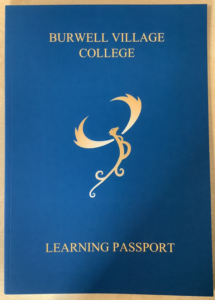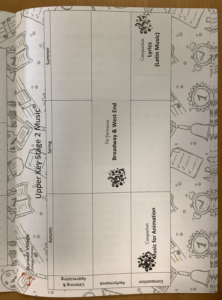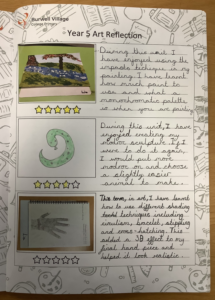Pupil Choice
Taking a degree of responsibility for their own study is an important part of pupils’ development towards becoming proactive, self-directed learners – a skill which is vital in their later academic life.
For two afternoons each week, pupils will study units of their choice from a selection within Cultural Capital, design and technology, art and music.
The children will choose three out of four available topics for each subject every year (one per term in each subject) with the selection of topics on offer being different in each phase (Y1 & Y2, Y3 & Y4 and Y5 & Y6). This means that the children can take ownership of their learning according to the development of their personal interests as the year progresses.
Cultural Capital
To enrich our curriculum offer further, a variety of Cultural Capital units are available during the pupil choice afternoons. These units of work are based on enterprise or community, performance or production, global issues or cultural understanding and digital media.
Our enterprise units introduce the pupils to the world of work and support them in understanding the value of money. As society moves away from physically handling money, we endeavour to provide our pupils with real-life contexts where they can use concrete money to make choices about saving and spending based on their own wants and needs and those of others.
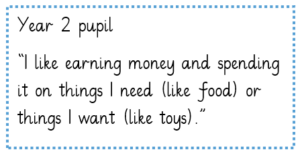
To develop the pupils’ sense of belonging within and beyond the school, our community units demonstrate how the pupils can have a positive, immediate impact on the local area. Volunteering is a key thread in their learning and ensures the pupils are physically involved.

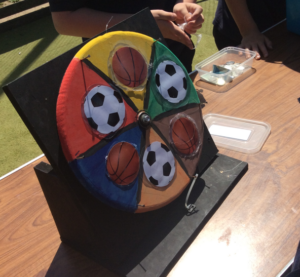
Our performance units, based on stories, pantomime or Shakespeare, are deliberately planned on a smaller scale to ensure that every participant can take a leading role. Developing the confidence and the ability to speak publicly whilst conveying meaning through body language and facial expressions are key skills necessary to succeed in countless aspects of life. For those with an interest in how things work behind the scenes, our production units provide an insight into the art of make-up, costume, props and backdrops.
As the digital age progresses, pupils will need to be equip to use a variety of programs to perform tasks within their everyday and work life. Therefore, to complement of computing curriculum, our digital media units support the pupils in developing the knowledge and skills necessary to create interactive presentations, educational quizzes and videos.
Often, pupils encounter complex worldwide issues in the news or through social media. Issues such as these can be daunting if little is known about the topic. Our units based on global issues and their impact aim to provide the pupils with the necessary, age-appropriate knowledge in relation to pollution, habitat destruction and climate change whilst empowering them to take action themselves. Furthermore, our cultural understanding units give the pupils the opportunity to talk openly, but sensitively, about their own and others’ beliefs. Through scenario-based discussion and debate, pupils demonstrate respect and tolerance whilst learning how to safely challenge discrimination.
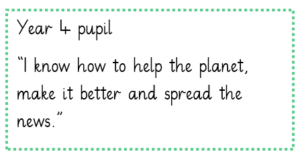
Art
As well as gaining a broad appreciation of the work of eminent artists and cultures throughout history, our pupils learn and develop the drawing, painting and sculpture skills involved in creating pieces of art from a wide range of artistic movements. Full details can be found in our art progression document.
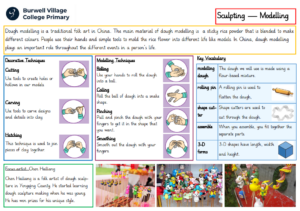 Each unit of work has a knowledge organiser. These can be found in the Children’s Area.
Each unit of work has a knowledge organiser. These can be found in the Children’s Area.
Design and Technology
By the end of their primary education, pupils will be competent and confident in the range of skills that comprise the design, production and evaluation processes of design and technology (DT). Every year, the children will participate in three from a choice of four DT projects, including cooking and nutrition, structures, mechanisms and electrical systems, progressively building upon their DT skills each year within different contexts. Full details can be found in our design and technology progression document.
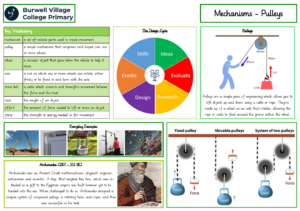 Each unit of work has a knowledge organiser. These can be found in the Children’s Area.
Each unit of work has a knowledge organiser. These can be found in the Children’s Area.
Music
Listening and appreciation, performance, and composition are the broad areas of study in music through which pupils will develop their knowledge, understanding and love of music. Each year, they will learn about different genres of music including a wide range of musicians and their impact. Full details can be found in our music progression document.
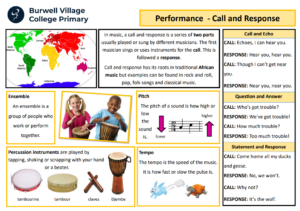 Each unit of work has a knowledge organiser. These can be found in the Children’s Area.
Each unit of work has a knowledge organiser. These can be found in the Children’s Area.
Learning Passport
When beginning Year 1, pupils are presented with a Learning Passport. This is a special book that every pupil has so that they can record their learning journey throughout their time at Burwell Village College Primary.
Learning Passports celebrate the individual’s achievements and demonstrate the breadth of learning within each subject.
